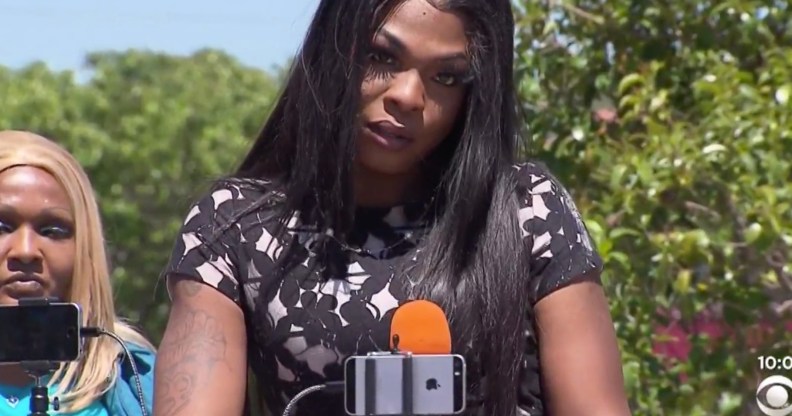Black trans women keep being murdered. So this New Yorker decided to do something about it

Muhlaysia Booker, a trans woman who was attacked in Dallas, says she’s thankful to be alive – less than a month before being murdered. (CBS 11)
At least 19 transgender people have been violently killed in the US this year, with all but one of them – Jordan Cofer, who was shot by his own brother in the Dayton mass shooting – being black trans women.
The life expectancy for a black trans woman in the US is just 35 years old.
“Their lives are being taken away from them simply for being who they are,” said Laverne Cox, in a July BuzzFeed interview.
“We have to lift the stigma around trans people existing. Your attraction to me as a trans woman is not a reason to kill me.”
Being black, trans and a woman means living at the violent intersection of racism, sexism, homophobia, biphobia and transphobia. This demographic is more likely to be unemployed or homeless. They face overwhelming barriers to housing and healthcare.
Many of the black trans women who were murdered were initially misgendered in police reports. Some of them were killed by partners. There are killers who remain at large, while others have been identified, arrested and charged.
Each case is different, and not all involve clearcut anti-trans motives – although, according to the Human Rights Campaign, even when the violence isn’t clearly transphobic, “the victim’s transgender status may have put them at risk in other ways, such as forcing them into unemployment, poverty, homelessness and/or survival sex work”.
An epidemic of ‘relentless and unacceptable violence’.
In New York, one queer man looked at this epidemic of “relentless and unacceptable violence” against black trans women and realised he could no longer do nothing. So, he founded the Black Trans Travel Fund, a mutual-aid project that will try to help black trans women move safely through spaces that seem, on the basis of all the available evidence, violently opposed to their very existence.
“Earlier this summer, three black trans women, Muhlaysia Booker, Michelle ‘Tamika’ Washington and Paris Cameron, were murdered within a span of eight days,” Devin Lowe, an actor in the US who founded BTTF, tells PinkNews.
“As I stood in solidarity at rallies and vigils for these girls, listening to various people talk about these travesties, and the need to protect black trans women, I found myself overcome with anger,” Lowe says.
“What are people actually doing to help protect black trans women? What can be done?”
Lowe, who says that listening to his partner – a black trans woman – describe the daily harassment she faced when using public transport “pained me no end”, realised he couldn’t keep hearing the needs of black trans women without doing something about it. He set up the BTTF the same week.
“My goal for the Black Trans Travel Fund is to truly provide a greater level of safety for black transgender women across the United States when it comes to travel,” Lowe says, “as well as making it easier for allies of black trans women to leverage their resources in order to offset the financial cost of private transportation for black trans women that is often so difficult to afford.”
The ‘backbone’ of the LGBT+ community.
This grassroots initiative is, Lowe says, a “perfect example of black trans people taking on the work in order to keep each other safe where our government and other communities have failed”.
Black trans women “have always been the backbone of our movements” and we must keep them “safe from harm”, he says.
Allies can donate directly to the fund, which has a simple process: women in need of funding can request up to $50 for travel, twice a month, by filling out a form.
The BTTF team verify the identity of the requesters and redistribute the funds via the women’s preferred payment method, so they can then purchase car rides home using services like Uber or Lyft.
“One we acquire enough funding, we have plans to develop our own app so that women can request rides directly from our previously vetted drivers,” Lowe says. From a $2,500 grant that BTTF received in its first week, it currently operates in New York and New Jersey, with plans to roll out to other states as soon as funds allow.
Lowe adds that for those without the financial resources to donate, following the BTTF on social media and telling people it exists also helps.
“Spread the word about us amongst your networks, so that black trans women in need can find us, and non-black and cisgender comrades who are able to can pour into our work,” he says.
The names of the black trans women known to have been murdered this year are Tracy Single, Dana Martin, Jazzaline Ware, Ashanti Carmon, Claire Legato, Muhlaysia Booker, Michelle Washington, Paris Cameron, Chynal Lindsey, Chanel Scurlock, Zoe Spears, Brooklyn Lindsey, Denali Berries Stuckey, Kiki Fantroy and Pebbles LaDime Doe.
Donate to the BTTF via Cashapp: $BlackTransTravelFund, Venmo: @BlackTransTravelFund and Paypal: [email protected].
Follow the BTTF on Twitter, Instagram and Facebook

